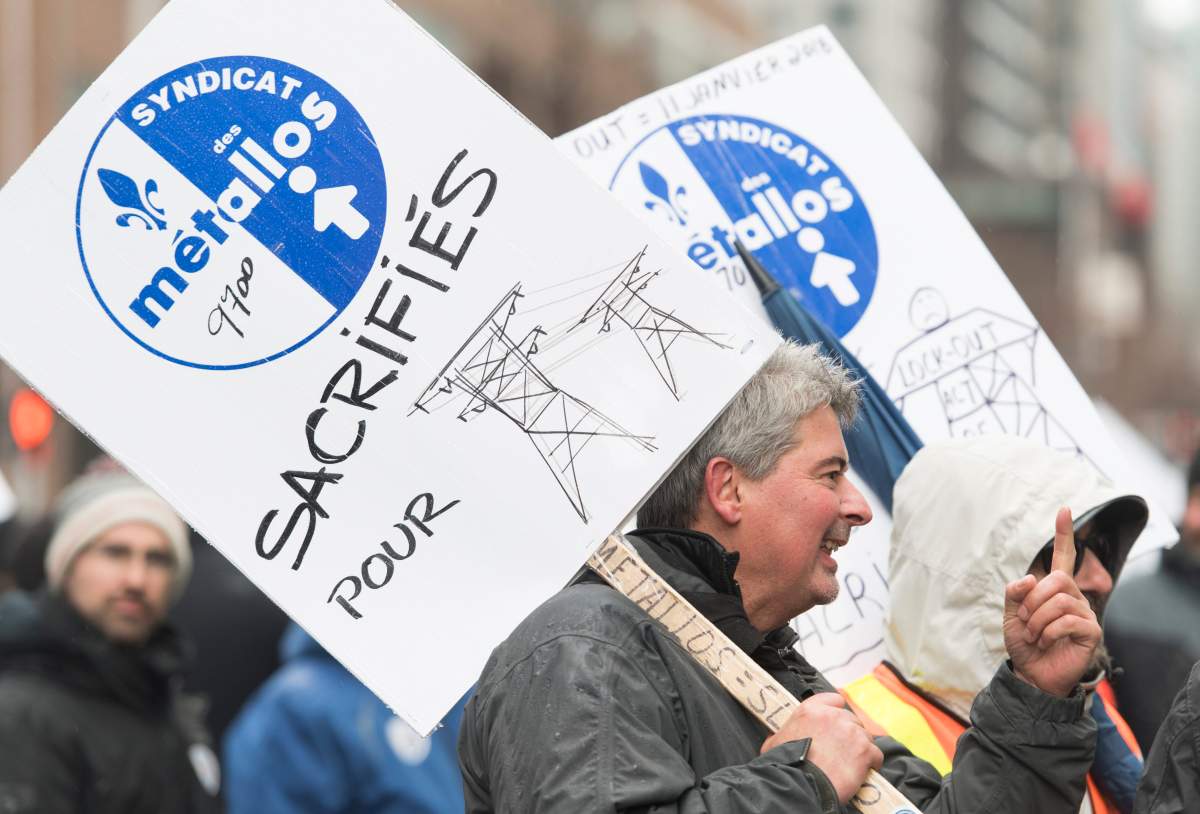As workers marked the one-year anniversary of the lockout at the ABI aluminum smelter in Bécancour, Que. Friday, the impact of the lengthy conflict was being felt throughout the region.

In addition to upending the lives of the plant’s 1,030 workers, the lockout is creating concern in the municipal administration and complicating life for local businesses. The slowdown has also deprived the provincial utility, Hydro-Quebec, of an estimated $215 million in revenues from sales it would have normally made to the smelter.
READ MORE: Trudeau impresses Hamilton labour boss during steel and aluminium tour
The town of Bécancour, hit by the closure of the Gentilly-2 nuclear reactor in 2012, relies heavily on ABI, which accounts for about 20 per cent — $4.5 million — of its tax base. It would be a “catastrophe for the region” if the smelter closed for good, Mayor Guy Dubois said.
“We prefer not even to think about that,” Dubois said in a telephone interview. “But like it or not, we always have that at the back of our minds. For the moment, we have built our budget as though ABI was a corporate citizen as was the case in the past.”
READ MORE: Justin Trudeau calls idea that Canada’s steel could threaten U.S. security ‘just silly’
In 2018, despite the fact ABI gradually cut production and is now operating at one-sixth of capacity, Bécancourdid not see a drop in tax revenues coming from the company.
WATCH BELOW: Freeland says U.S. imposition of steel and aluminum tariffs is ‘unjustified and illegal’

But the plant’s unionized workers, whose average annual salary is around $80,000, are big contributors to the region’s economy. Currently, they are getting just $600 a week from their union, less than half their usual wages.
The situation has had repercussions on local merchants, in particular restaurants, Dubois said, but so far none has been forced to close its doors.

Get weekly money news
“The current context of full employment has helped a lot,” he explained. “It would be very different if the unemployment rate was higher.”
Still, the lockout has had a negative impact in Bécancour’s industrial park and port. ABI’s production cuts have meant a drop of about $1 million in revenues for the port, though this has been partly compensated by the development of new markets.
READ MORE: Donald Trump’s steel tariffs a ‘crazy idea’: Conference Board of Canada
There are no signs that the labour conflict is close to being resolved. The two sides show little sign of budging despite negotiating sessions and a mediation process that ended Dec. 21.
WATCH BELOW: ‘This is not a normal trade irritant’: Freeland

The opposing sides are the United Steelworkers and ABI, which is 75 per cent owned by Pittsburgh-based Alcoa Corp. and 25 per cent by Montreal-headquartered Rio Tinto Alcan Inc. The main issues dividing the union and the employer are the pension plan and seniority provisions covering the assignment of workers.
“I’ve joked in the past that the only thing we can do is pray,” Dubois said.
“We hope that each side will be able to compromise a little. That’s the only way out of this.”
After a year living on a much lower salary than usual, more and more workers are struggling to make ends meet. They say they have no intention of returning to work without a negotiated collective agreement, so many are turning to part-time jobs.
Martine Gauthier, who has worked nearly 31 years at ABI, will soon be eligible for retirement, but she refuses to leave before the conflict is resolved.
READ MORE: Donald Trump warns Canada won’t get a break on steel tariffs without ‘fair’ NAFTA deal
Her 25-year-old daughter is a graduate student at the Université de Sherbrooke, and to help cover her tuition expenses, Gauthier is taking on a part-time job in addition to her picket duties. “Is Mom going to stop paying for her studies? No. My daughter is a good student. I cannot abandon her,” she said by telephone.
WATCH BELOW: Ford says steel, aluminium tariffs contributed to Oshawa GM closure

Clement Massé, president of the union local, said the workers’ resolve is not cracking. But he acknowledged that he did not expect the impasse to last so long.
“It’s been long,” Massé said in a telephone interview.
“You can’t say that people aren’t fed up. What they want is a negotiated agreement. Naturally, we are going to meet our members in the coming weeks.”
Union members planned a demonstration Friday afternoon outside the office of the local member of the provincial legislature, Donald Martel, who represents the governing Coalition Avenir Quebec. Their aim is to remind the government how long the conflict has dragged on.
READ MORE: Donald Trump’s steel, aluminum tariffs: Here’s what you need to know
This week, the government announced the creation of a three-member working group drawn from bureaucrats in the Labour Department to examine the situation, but Labour Minister Jean Boulet said the government is not yet prepared to try to force a settlement.
“I will not impose a solution,” he said. “I spoke up and expressed my huge disappointment at the way the two sides behaved during the mediation, but I can’t do the job on my own.”


Comments
Want to discuss? Please read our Commenting Policy first.